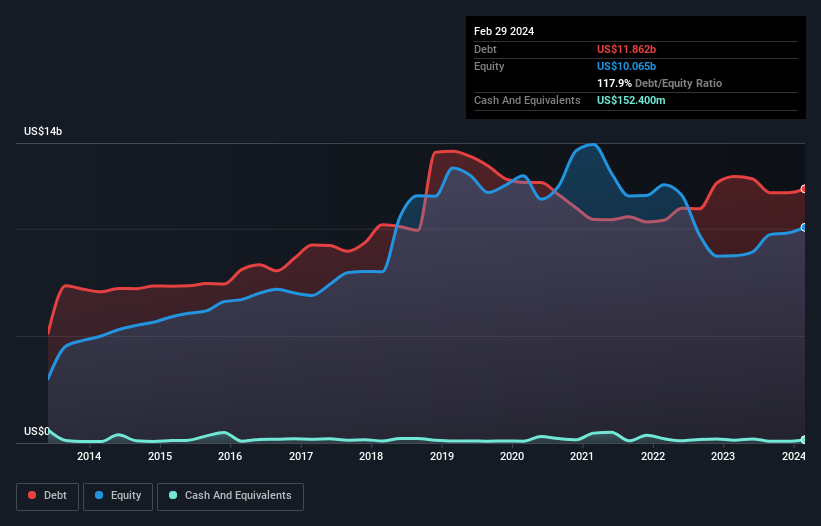- United States
- /
- Beverage
- /
- NYSE:STZ
These 4 Measures Indicate That Constellation Brands (NYSE:STZ) Is Using Debt Reasonably Well

Howard Marks put it nicely when he said that, rather than worrying about share price volatility, 'The possibility of permanent loss is the risk I worry about... and every practical investor I know worries about.' It's only natural to consider a company's balance sheet when you examine how risky it is, since debt is often involved when a business collapses. We note that Constellation Brands, Inc. (NYSE:STZ) does have debt on its balance sheet. But the real question is whether this debt is making the company risky.
When Is Debt Dangerous?
Generally speaking, debt only becomes a real problem when a company can't easily pay it off, either by raising capital or with its own cash flow. If things get really bad, the lenders can take control of the business. While that is not too common, we often do see indebted companies permanently diluting shareholders because lenders force them to raise capital at a distressed price. Having said that, the most common situation is where a company manages its debt reasonably well - and to its own advantage. When we think about a company's use of debt, we first look at cash and debt together.
See our latest analysis for Constellation Brands
How Much Debt Does Constellation Brands Carry?
As you can see below, Constellation Brands had US$11.9b of debt at February 2024, down from US$12.4b a year prior. Net debt is about the same, since the it doesn't have much cash.

How Healthy Is Constellation Brands' Balance Sheet?
According to the last reported balance sheet, Constellation Brands had liabilities of US$3.14b due within 12 months, and liabilities of US$12.5b due beyond 12 months. On the other hand, it had cash of US$152.4m and US$1.08b worth of receivables due within a year. So it has liabilities totalling US$14.4b more than its cash and near-term receivables, combined.
This deficit isn't so bad because Constellation Brands is worth a massive US$47.9b, and thus could probably raise enough capital to shore up its balance sheet, if the need arose. However, it is still worthwhile taking a close look at its ability to pay off debt.
We use two main ratios to inform us about debt levels relative to earnings. The first is net debt divided by earnings before interest, tax, depreciation, and amortization (EBITDA), while the second is how many times its earnings before interest and tax (EBIT) covers its interest expense (or its interest cover, for short). Thus we consider debt relative to earnings both with and without depreciation and amortization expenses.
Constellation Brands has net debt to EBITDA of 3.2 suggesting it uses a fair bit of leverage to boost returns. But the high interest coverage of 7.3 suggests it can easily service that debt. Constellation Brands grew its EBIT by 7.3% in the last year. Whilst that hardly knocks our socks off it is a positive when it comes to debt. The balance sheet is clearly the area to focus on when you are analysing debt. But it is future earnings, more than anything, that will determine Constellation Brands's ability to maintain a healthy balance sheet going forward. So if you're focused on the future you can check out this free report showing analyst profit forecasts.
Finally, while the tax-man may adore accounting profits, lenders only accept cold hard cash. So it's worth checking how much of that EBIT is backed by free cash flow. Over the most recent three years, Constellation Brands recorded free cash flow worth 53% of its EBIT, which is around normal, given free cash flow excludes interest and tax. This free cash flow puts the company in a good position to pay down debt, when appropriate.
Our View
Constellation Brands's interest cover was a real positive on this analysis, as was its EBIT growth rate. On the other hand, its net debt to EBITDA makes us a little less comfortable about its debt. When we consider all the factors mentioned above, we do feel a bit cautious about Constellation Brands's use of debt. While debt does have its upside in higher potential returns, we think shareholders should definitely consider how debt levels might make the stock more risky. The balance sheet is clearly the area to focus on when you are analysing debt. However, not all investment risk resides within the balance sheet - far from it. For example - Constellation Brands has 3 warning signs we think you should be aware of.
If you're interested in investing in businesses that can grow profits without the burden of debt, then check out this free list of growing businesses that have net cash on the balance sheet.
New: AI Stock Screener & Alerts
Our new AI Stock Screener scans the market every day to uncover opportunities.
• Dividend Powerhouses (3%+ Yield)
• Undervalued Small Caps with Insider Buying
• High growth Tech and AI Companies
Or build your own from over 50 metrics.
Have feedback on this article? Concerned about the content? Get in touch with us directly. Alternatively, email editorial-team (at) simplywallst.com.
This article by Simply Wall St is general in nature. We provide commentary based on historical data and analyst forecasts only using an unbiased methodology and our articles are not intended to be financial advice. It does not constitute a recommendation to buy or sell any stock, and does not take account of your objectives, or your financial situation. We aim to bring you long-term focused analysis driven by fundamental data. Note that our analysis may not factor in the latest price-sensitive company announcements or qualitative material. Simply Wall St has no position in any stocks mentioned.
About NYSE:STZ
Constellation Brands
Produces, imports, markets, and sells beer, wine, and spirits in the United States, Canada, Mexico, New Zealand, and Italy.
Reasonable growth potential average dividend payer.
Similar Companies
Market Insights
Community Narratives



